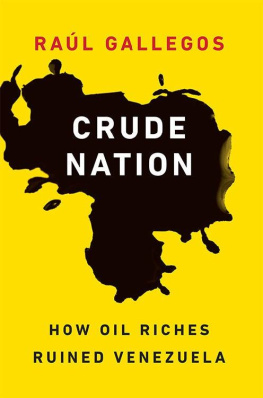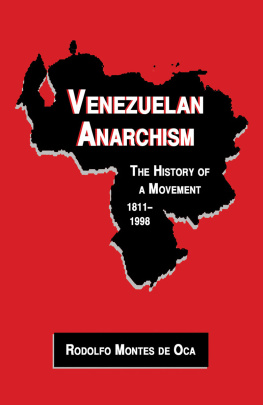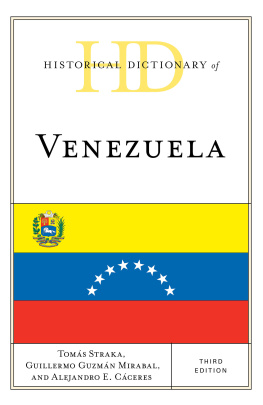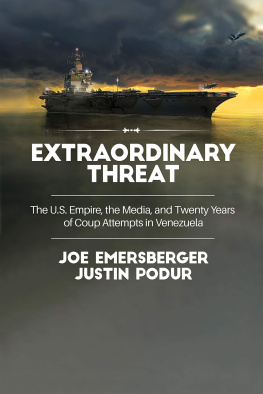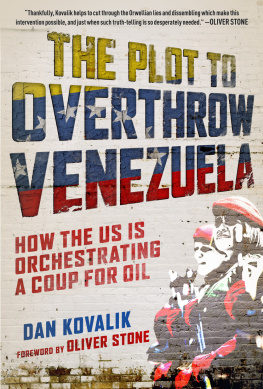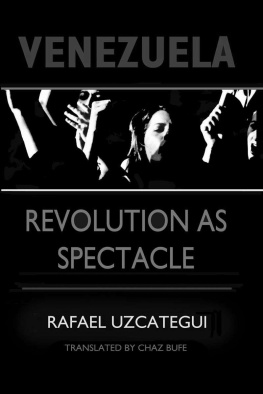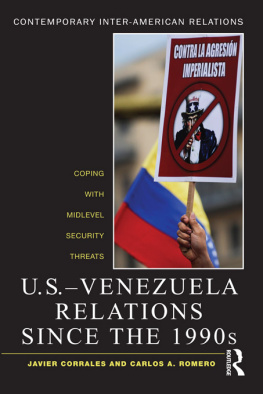Ral Gallegos is a sharp-eyed guide to the alternate universe that is contemporary Venezuela. His new book, Crude Nation, makes for a lively, surprising read.
Paul M. Barrett, author of Law of the Jungle
Gallegos provides a compelling, enlightening view into the everydaychallenging readers to understand life in one of the worlds most volatile economies.
Ian Bremmer, president of the Eurasia Group and author of Superpower: Three Choices for Americas Role in the World
Crude Nation ponders Hugo Chvezs legacy: an economy run more on magical realism than on either Keynes or Marx. How does a country with the worlds largest oil reserves fail so miserably in virtually every critical sector? Gallegos has a compelling theory why and has more answers than most.
Ann Louise Bardach, PEN awardwinning journalist and author of Without Fidel: A Death Foretold in Miami, Havana, and Washington
Crude Nation is essential reading for those wanting to understand what is happening in Venezuela today and what it will take to turn that nation around.
Shannon K. ONeil, Nelson and David Rockefeller Senior Fellow for Latin American Studies at the Council on Foreign Relations and author of Two Nations Indivisible: Mexico, the United States, and the Road Ahead
Ral Gallegos does a superb job chronicling Venezuelas myriad woes. No other account captures in such stark terms and vivid detail how calamitous the utter mismanagement of oil riches can be for an economy and society. Crude Nation tells a tragic, cautionary tale one with untold costs for most Venezuelans.
Michael Shifter, president of the Inter-American Dialogue think tank
Crude Nation

Crude Nation
How Oil Riches Ruined Venezuela
Ral Gallegos
Potomac Books | An imprint of the University of Nebraska Press
2016 by Ral Gallegos
All photographs in this volume are courtesy of Vladimir Marcano.
Cover designed by University of Nebraska Press; cover image iStockphoto.com/mattjeacock
Author photo courtesy of author
All rights reserved. Potomac Books is an imprint of the University of Nebraska Press.
Library of Congress Cataloging-in-Publication Data
Names: Gallegos, Ral, 1973 author.
Title: Crude nation: how oil riches ruined Venezuela / Ral Gallegos.
Description: Lincoln: Potomac Books, an imprint of the University of Nebraska Press, 2016. | Includes bibliographical references and index.
Identifiers: LCCN 2016010857
ISBN 9781612347707 (hardback: alk. paper)
ISBN 9781612348575 (epub)
ISBN 9781612348582 (mobi)
ISBN 9781612348599 (pdf)
Subjects: LCSH : Petroleum industry and tradeVenezuelaHistory21st century. | Financial crisesVenezuelaHistory21st century. | VenezuelaEconomic conditions21st century. | BISAC : POLITICAL SCIENCE / Economic Conditions. | BUSINESS & ECONOMICS / International / Economics.
Classification: LCC HD 9574. V 42 G 35 2016 | DDC 330.987dc23 LC record available at https://lccn.loc.gov/2016010857
The publisher does not have any control over and does not assume any responsibility for author or third-party websites or their content.
To Emma
Be skeptical. Be pragmatic. Understand money.
You should have feard false times when you did feast.
William Shakespeare, Timon of Athens
If you want to sustain a reputation for generosity, therefore, you have to be ostentatiously lavish; and a prince acting in that fashion will soon squander all his resources, only to be forced in the end, if he wants to maintain his reputation, to lay excessive burdens on the people.
Niccol Machiavelli, The Prince
Contents
Writing a book about Venezuelas economy was a challenge. Most government officials refused to return calls, canceled appointments, and ignored questions. Sometimes top politicians whom I knew well from my years in Venezuela felt they could not risk speaking openly or privately about how they ran the country. Most business leaders refused to talk about their operations for fear of incurring the wrath of the government, losing their livelihoods, or getting thrown in jail. And street vendors would immediately clam up once they knew I was writing a book. Sometimes it seemed as though I would find more openness if I were writing an expos of the sexual lives of Venezuelans. Talking about money and economics in Venezuela has become taboo. It is for this reason that those who helped my research and spoke to me on or off the record deserve my gratitude.
I am indebted to the gracious help of Oscar Garca Mendoza, who generously shared his Rolodex for my research and gave me a breathtaking insight into banking. Luis Vicente Len, from Datanalisis, proved invaluable with data and insight into the tastes, desires, and political inclinations of Venezuelan consumers. Datanalisis polls are the gold standard of polling in a nation where honest, reliable data is hard to come by. Robert Bottome, from VenEconoma, has always been there to dispel doubts and share his vast insight into the economy of a country he knows well. Antonieta de Lpez and Melquades Pulido were generous with their time and contacts to help me get a better view of private sector companies. Alexandra Belandia opened the world of the Caracas barrios.
Economists such as Asdrbal Oliveros, at Ecoanaltica, and Alejandro Grisanti, at Barclays, were always ready to share insights and economic estimates. Ruth de Krivoy shared her experience as a former central banker in Venezuela. Francisco Monaldi shared contacts and suggested research as an expert oil economist. Carlos Mendoza Potell was generous with his time and research, providing me his take on the governments oil ideology. Luis Xavier Grisanti offered his vast knowledge of the oil business from both an academic perspective and the point of view of foreign oil companies. And the late Juan Socas Lpez gave unique insight into the workings of Venezuelas arcane exchange rate rules. His vast experience will be missed.
In the world of business, Alberto Vollmer, the CEO of Ron Santa Teresa, did not hesitate to discuss his experience as a rum maker, a rich and valuable testimony for future Venezuelans. Manuel Larrazbal minced no words in laying out the experience of food company Polar. Many other company executives and legal experts in various industries shared their time, but for safety reasons I cannot mention them here. I am particularly indebted to many working in the oil industry who took a risk by giving me far more information about the business than they were obligated to do. You know who you are.
Elio Ohep, a gracious counselor and friend, proved invaluable in my look into oil and was a loyal hiking partner up the vila during my visits. Many thanks for that. My friends in the media, especially Pietro Pitts were invaluable in their willingness to speak openly about life in Venezuela and to share tidbits that helped shape this book. Above all, I owe an immense debt to Mayela Armas, a friend and colleague whose deep experience covering economics was a wealth of information. In my humble opinion, Mayela is and has been for years the most dogged, well connected, and knowledgeable economics journalist in Venezuela.
Thanks go to my many other friends in Caracas, too many to name here, for their time, hospitality, and help, particularly Marvin and Adriana. My friend 1-800- LEO made my life possible for years in Venezuela, and his resourcefulness was always impressive, even inspiring. He exemplifies the warmth and welcome I have come to expect from Venezuelans and that I truly admire.

